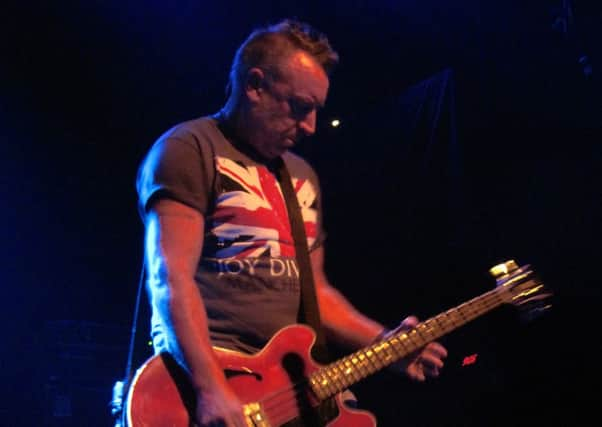Secrets of making an era-defining album


IN 1983 New Order emerged from the shadows of the gloomy sound of Joy Division, and brought synthesizers and dance beats to centre stage.
While recording their 1981 album Movement, former New Order bass player Peter Hook says that the band were still reeling from the death of Joy Division frontman Ian Curtis.
Advertisement
Hide AdAdvertisement
Hide Ad“Movement had Joy Division music with New Order vocals, but Power, Corruption and Lies was all New Order,” says Hook.
“What made Power, Corruption and Lies different from the earlier stuff was that we decided to do our own production.
“Martin Hammett didn’t have faith in mine or Bernard’s vocals, so they’re quite low in the mix on Movement.
“Power, Corruption and Lies felt like the first New Order album,” he adds.
Advertisement
Hide AdAdvertisement
Hide AdAlongside the album, the group released the singles Everything’s Gone Green, Temptation and Blue Monday – tracks that never made it onto the album.
“We treated the albums and singles separately, which is why you didn’t find Love Will Tear Us Apart or Transmission on an album,” says Hook.
“We felt uncomfortable about charging people for the same track more than once.
“That’s standard now – you have all the different formats. Maybe we missed out, but there are more important things than making money,” he adds.
Advertisement
Hide AdAdvertisement
Hide AdThe single Blue Monday became the best selling 12-inch of all time and saw the group find a new identity as Britain’s more cheerful answer to Kraftwerk.
“There’s this weird circularity about it,” says Hook. “We were trying to emulate Kraftwerk, and they ended up trying to emulate Blue Monday.
“They went to the same studio where we recorded Blue Monday to try and capture the sound, and the equipment was quite old.
“They just turned around and left, they didn’t believe we’d recorded it there,” he says. Prior to Power, Corruption and Lies, New Order and Joy Division’s album titles had been deliberately ambiguous.
Advertisement
Hide AdAdvertisement
Hide Ad“The album titles have always been important, and I think in the most part they read a bit like an essay,” says Hook.
“You had Unknown Pleasures, Closer, then Still when Ian died. Then you had Movement and Power, Corruption and Lies.
“The only one I hated, and still hate, is Get Ready. It was just me and Bernard voting on it, and we couldn’t agree. We ended up going for the lowest common denominator.
“When we were recording the album I was reading George Orwell’s 1984 – I was quite bookish before the drugs,” says Hook.
Advertisement
Hide AdAdvertisement
Hide Ad“On the back it had a quote from the Evening Standard which read something like ‘A startling novel of power, corruption and lies’, and I just thought ‘that’s the title’.”
The experience in the recording studio had become more democratic. Without the steering influence of Ian Curtis and producer Martin Hammett, the group were able to embrace new technology, and experiment with different ways of writing music. “When we recorded the album we had a real workman-like attitude,” says Hook. “We worked really hard on this album, trying to learn this new equipment, and trying to make it sound electronic and acoustic at the same time – it’s a standard in music now, but at the time we were breaking new ground.
“Bernard used to come in wearing a white lab coat, Hammett was a bit like a mad professor, so I think he was trying to keep that alive.”
“I’ve heard quite a few rumours about Bernard putting a tab of acid under his tongue each morning when we were in the studio – I can tell you that didn’t happen.
Advertisement
Hide AdAdvertisement
Hide Ad“Drugs in the studio don’t work. They just block creativity and make you lazy – there’s no way he could have worked as hard as he did if he was doing drugs,” he adds.
Employing the talents of artist Peter Saville, it was the group’s innovative artwork that set them apart.
“This is the album cover I’m most fond of, I also think that it’s the most important,” says Saville.
Peter Hook and the Light will be performing the albums Movement and Power, Corruption and Lies at the Cockpit, Leeds, on October 25.
Out of Joy Division came New Order – with dance beats
Advertisement
Hide AdAdvertisement
Hide AdPOST punk band Joy Division formed in 1977 and comprised Ian Curtis (vocals), Peter Hook (bass guitar), Stephen Morris (drums) and Bernard Sumner (guitar).
After Ian Curtis’s death in 1980, the group carried on, changing their name to New Order. Bernard Sumner became the group’s reluctant vocalist and they recruited Gillian Gilbert as keyboard player and guitarist.
New Order’s first album Movement was released in November 1981 – it was during this time that the band visited New York and were introduced to the city’s clubbing scene.